Innovation projects
Aguas de Alicante (AMAEM) has committed to innovation in all areas of work, from the research of basic processes to the application of the most advanced solutions. Advances are achieved through technological surveillance. Its support in the creation and incorporation of technologies and cutting-edge solutions enables Aguas de Alicante to stay ahead and offer a better service. In accordance with the Sustainable Development Goals, we consider that technological advances and investment in scientific innovation are essential in finding permanent solutions to economic and environmental challenges.
In the last five years, Aguas de Alicante has worked on 26 projects, covering solutions relating to the detection and location of leaks, energy optimisation, flood prediction and mitigation, asset management, efficient consumption, resource reuse, and safety and health, among others.
A key aspect in the development of research, development and innovation projects is collaboration with other companies and organisations, such as local or international universities, technology centres and government bodies. This strategy has enabled us to tackle projects with a greater scope, play an active role in knowledge forums, and work in the framework of European programmes for the development of research, development and innovation.
Some examples of innovative projects developed in recent years are:
-
Controlled Testing Environment (sandbox) for the Integral Water Cycle
The Controlled Test Environment (sandbox) of the Integral Water Cycle is a project funded by the European Union, under the European Regional Development Fund Community of Valencia 2021-2027, through the Valencian Institute of Competitiveness and Innovation IVACE +i (Valencian Government). The funding, approved in the Public Procurement of Innovation line of the 2024 Innovation Aid Call, amounts to 115,735€.
The project's challenge is to overcome traditional regulatory models with new, more agile formulas that promote innovation.
Throughout its three-year duration, this innovative project, unprecedented in the sector, will aim to develop and implement a technical-legislative sandbox for the integral water cycle in Spain. It seeks to apply innovative companies' solutions to improve citizen services and surpass traditional regulatory models with formulas that promote innovation.
Thanks to this subsidy, Aguas de Alicante will be able to promote Public Innovation Procurement activities with the city councils of the towns where it manages the integral water cycle (Alicante, Sant Vicent del Raspeig, Sant Joan d'Alacant, El Campello, Monforte del Cid and Petrer), in collaboration with partners from the Valencian innovation system, such as the Technological Institute of Computer Science (ITI) or the Alicante University Business Foundation (Fundeun). All this, with the collaboration of the Alicante City Council.
This space for research and collaboration will generate the necessary knowledge and documentation to enable the launch of the project competition in the company and successfully carry out the pilot projects of participating startups, overcoming traditional models with agile formulas in favor of innovation. During its execution, training and capacity building in the sandbox for internal staff and Public Administration technicians is planned; the design of the sandbox instrument itself; and its launch and implementation, with pilots involving innovative companies.
Aguas de Alicante has always been committed to improving sustainability and citizens' quality of life, in collaboration with expert technological centers, Universities, Associations, small and large innovative companies, and society as a whole. The Sandbox is born to contribute to this, which, together with Public Innovation Procurement, will be the instruments used to promote new market opportunities, drive demand for innovative products, and create new business opportunities between start-ups and established companies in the productive fabric.
Consult the Sandbox Usage Guide for the Integral Water Cycle

-
B3CLab, a project supported by the Valencian Agency of Innovation
Sustainable solution for water sample analysis in quality control laboratories based on biopolymer containers
Do you know how many plastic containers we generate and dispose of in our laboratories? Would it be possible to replace these plastic containers used until now with biodegradable or compostable bottles, and thus prevent the generation of microplastics, emerging pollutants potentially harmful to the environment?
As part of their commitment to innovation and the environment, Aguas de Alicante, together with AIMPLAS, the University of Alicante, Labaqua and Assur Medical, has started a research project titled: "Development of a sustainable solution based on biopolymer bottles for water sampling in quality control laboratories (B3CLab)".
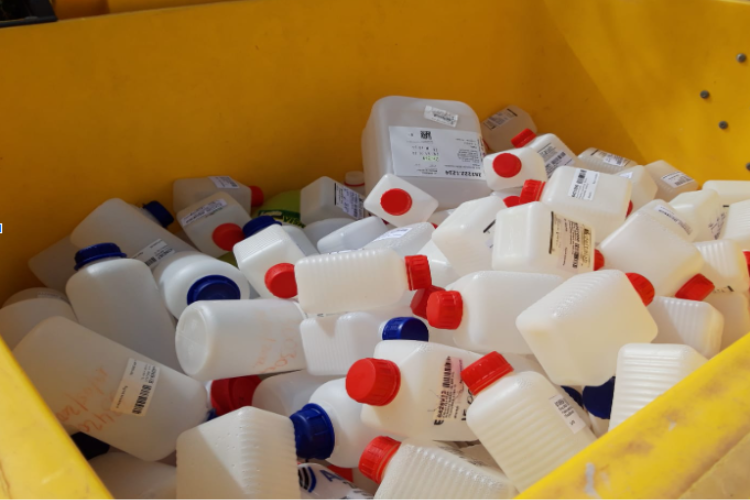
With an overall budget of 612,139.89 euros, the project has obtained a grant of 455,940.89 euros from the Valencian Innovation Agency (AVI), corresponding to the call for Strategic Collaboration Projects 2023, funded through the European Regional Development Fund (ERDF) 2021-2027. The proposal focuses on replacing the polymers commonly used in containers employed by quality control laboratories, which come from non-biodegradable petrochemicals, with biobased and biodegradable polymers. A biobased polymer (bio origin) is one that originates, wholly or partially, from biological material; it can come from trees, crops, grasses, algae or other plant-based waste.
The importance of this initiative becomes evident when considering that just in Alicante, the number of bottles consumed by the laboratories participating in the project exceeds 82,000 units annually. The elimination of these plastics would greatly contribute to reducing the carbon footprint of quality control laboratories, in line with the principles of Green Chemistry, or environmentally friendly chemistry. This principle states that quality control laboratories cannot introduce new pollution that risks the quality of the product being analyzed; in short, we cannot be part of the same problem we are working to avoid.
To this end, the main technological objective of B3CLab is the manufacturing of biobased bottles that meet the requirements for sampling drinking water and its subsequent analysis in quality control laboratories. To achieve this, the characteristics of different plastic polymers commonly used in analysis laboratories for sampling will be studied and compared under the same working conditions with the chosen biopolymers. In addition, their suitability will be verified by studying their quality from an analytical point of view, conducting migration studies and checking the results obtained in real samples, to ensure that there are no adsorption or desorption problems in these containers.
The data will be collected in a computer system that will allow statistical analysis, graphing, and detailing of data in the manufacturing process, as well as the analysis of organic and inorganic compounds, both for the bottles manufactured with the currently used polymers and for the bottles manufactured with the chosen biopolymer. Once the suitability study is completed, the sustainability, safety, and functionality of the chosen containers will be assessed, as well as the completion of their life cycle.
The data will be collected in a computer system that will allow statistical analysis, graphing, and detailing of the data in the manufacturing process, as well as the analysis of organic and inorganic compounds, both for bottles manufactured with the polymers currently used and for bottles manufactured with the chosen biopolymer. Once the suitability study is completed, the sustainability, safety, and functionality of the chosen containers will be analyzed throughout their entire life cycle.

-
Partnership for Innovation in Circular Economy and Sustainability
Aguas de Alicante has initiated the procedure for a Partnership for Innovation in circular economy and sustainability, in order to design an advanced control system for industrial discharges into the sewerage system (water quality sensors and data monitoring platform). The ultimate aim of discharge control is to enable the reuse of treated wastewater for the sustainability of water resources, or if this is not possible, its return to the environment in the best possible conditions.
An "Innovation Partnership" is an award procedure aimed at promoting Public Procurement of Innovation (PPI).
PPI is a formal tool that allows public purchasers to tender for the procurement of a good or service that does not exist as such on the market, for which it is necessary to develop R&D&I activities. For its part, the Innovation Partnership is a particular case of this Public Procurement, in which the required developments start from a basic degree of technological maturity (R&D), going through the whole process until reaching the deployment tests of the solution in a real environment.
Aguas de Alicante has had the collaboration of the University Institute of Water and Environmental Sciences of the University of Alicante (IUACA) and the University Institute of Water and Environmental Engineering (IIAMA) of the Polytechnic University of Valencia for the definition of the Association's requirements.
The project has been co-financed in 2021 by the Valencian Agency for Innovation and the European Union through the Operational Programme of the European Regional Development Fund (ERDF) of the Valencian Community.

-
Micromanage
One of the key strategies to ensure sustainable water supply in a context of increasing pressure on resources is the promotion of water reuse, which is fundamental in our region. In order to ensure the safe use of recycled water, it is a key requirement that the treatments it undergoes certify the removal of potentially dangerous pollutants (biotic and abiotic) for humans, animals and the environment. It is therefore important to provide access to technologies that can monitor the quality parameters of reclaimed water in a simple and effective way.
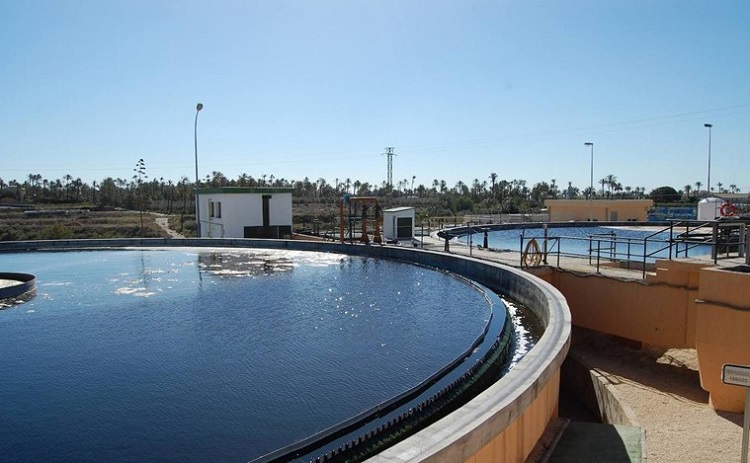
The MICROMANAGE project, partially subsidised by the Valencian Agency for Innovation (AVI) and the European Union through the ERDF programme, and in which LABAQUA, the University of Alicante and the company iGLS S.L. have participated, takes advantage of new technologies to improve water safety control plans that will help to comply with the new European reuse regulations. The implementation of innovative tools for the rapid microbiological assessment of reclaimed water brings together two cutting-edge technologies:
1) massive nucleic acid sequencing (metagenomics) to unveil the microbial composition and genetic content of environmental samples.
2) microfluidic qPCR that allows the simultaneous screening of up to 192 marker genes in several water samples.
In short, these are two technologies that, in combination, allow the identification of a much wider range of viruses and bacteria than is possible with traditional solutions, with greater sensitivity and speed.
These genetic analysis techniques will provide valuable information on water quality and advanced identification of potential biocontaminants, with a pioneering preventive approach.

-
Application of Augmented Reality to Infrastructure Management
In this project, AMAEM explored opportunities offered by augmented reality technologies in our field. As a result, AMAEM obtained a study of solutions and proposals for the near future that define the areas of work of most interest. On a more tangible scale, two applications have been developed that use this technology in different aspects of our activity:
- Internal application to locate and consult customer meters in a rural setting.
- Application open to the public to communicate and follow the evolution of the main works planned or under way in the city.
-
Metrawa
With over 2,000 km of water distribution pipes, one priority is to optimise decisions on which networks to renew and how much to invest. Metrawa is a decision support system for renewal of distribution networks that analyses all aspects relevant to the replacement of drinking water pipes and the impact on the required level of service. The multi-parameter analysis of Metrawa includes aspects such as:
- Structural analysis: based on a model of pipe ageing.
- Water analysis: suitability of the behaviour of water in the network.
- Economic analysis: optimal renewal time considering repair costs.
- Risk analysis: considering aspects such as traffic effects, impact on service users and the existence of sensitive areas.
Metrawa is integrated with the geographic information system so that GIS data can be incorporated to provide results that consider renewal priorities, expected costs and future evolution of the structural state of the network.
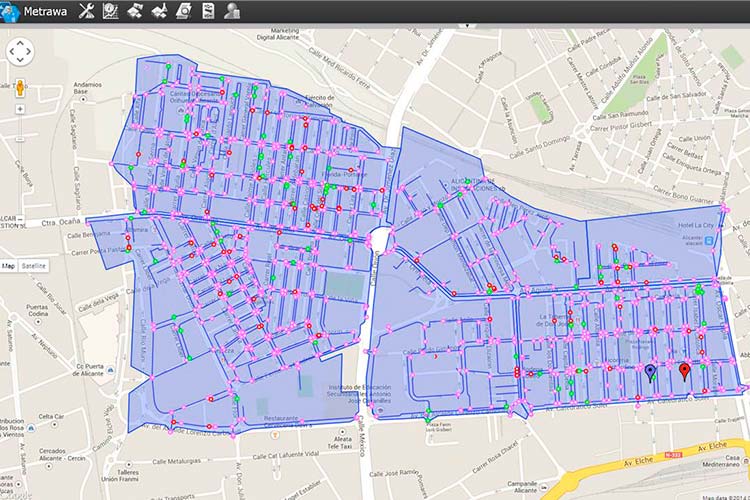
-
Photovoltaic covers
If solar panels are installed in manhole covers, the electricity that is generated can be used to supply measurement devices in the covers. The installation of measurement and communication systems in water supply and sewer networks is increasingly complex due to cost and difficulty. Considering these factors and the restrictions to installing elements in streets, it is a major challenge to collect the information we need to manage water and sewer networks. Aguas de Alicante, in collaboration with Bareslan, has tested and validated a solution for the integration of solar panels in some manhole covers. The panels are strong enough to withstand being walked on and are almost indistinguishable from standard metal covers. In addition, they can be used to standardise the design of manhole covers, which facilitates maintenance.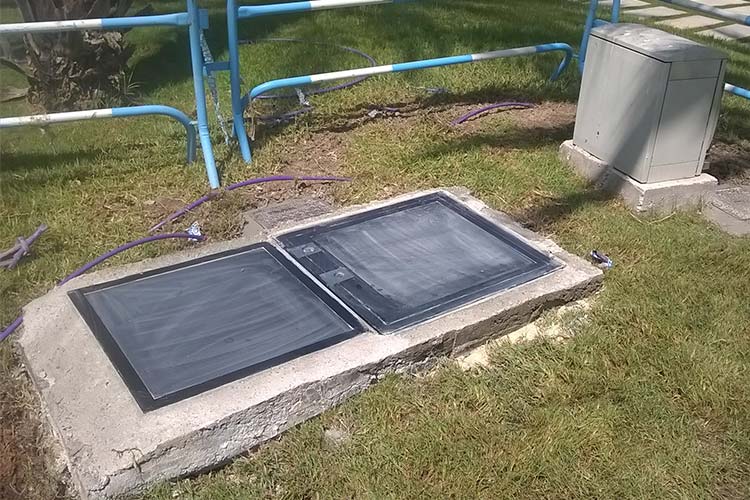
-
DAIAD
DAIAD (http://daiad.eu/)is an initiative supported by the EU's 7th Framework Programme, undertaken with research centres, NGOs and Greek, Swiss, German and British companies. One result of the project is the development of the Amphiro b1 device, which was given the Innovation Radar Prize by the European Commission in the 'Tech for Society' category. The shower monitor Amphiro, together with the smart meter, help people to develop an awareness of their water consumption. The devices are connected to smartphones and keep a record of the user's consumption, which helps to identify trends and make comparisons. Together with the meter, an app and web platform were created to monitor (hot) water and energy consumption in the home. In addition and no less importantly, a study was undertaken on how information strategies and awareness raising via the app affect consumption. This project is supported by the voluntary participation of over a hundred homes in Alicante, which tested the system for a year with the collaboration of various NGOs in the city.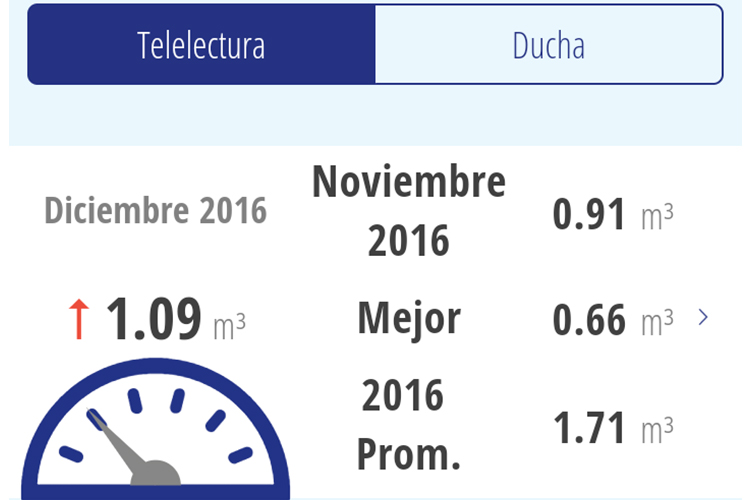
Smart meter Shower
December 2016 November 2016 0.91 m3
1.09 m3 Improvement 0.66 m3
2016 avg. 1.71 m3
-
ARA System
In open-air stores of reused water, stagnation and anaerobiosis may occur, associated with natural processes in this kind of reservoir. In the summer, fish may die suddenly due to high temperatures and the existence of organic matter, among other factors. To prevent these situations, a simple aeration device has been developed that is effective, energy efficient, and helps to maintain the right healthy conditions in this water.
-
iDroSmartwell
The efficient production of groundwater is now an obligation rather than an option. It allows operational and maintenance savings and is necessary because supply must be compatible with environmental protection, to ensure sustainability. Aguas de Alicante, in collaboration with SUEZ Advanced Solutions, has developed an advanced expert system to carry out continuous audits ofwell efficiency, and a complete analysis of the functioning of the unit comprised of the pump and the aquifer. This smart system can calculate efficiency indicators, maximise (hydraulic and electric) performance of the facility and prevent problems that could affect water production. IDroSmartwell is a unique, powerful tool with many benefits:- It provides complete, accurate information on the control of water bodies.
- It permits control of the operation, as a large number of water and electricity parameters are calculated and managed via an operating panel. The facility can also be automated and monitored remotely.
- It allows cost savings due to a reduction in the rate of faults and continuous monitoring of efficiency ratios, to optimise the facility.
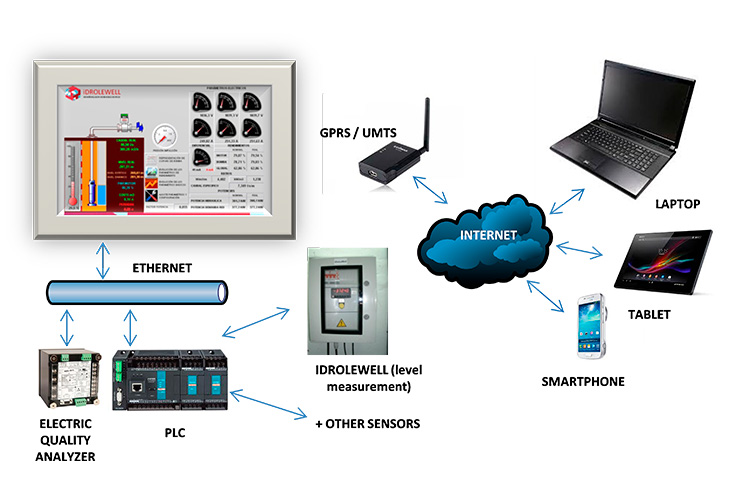
-
LIFE MERLIN
The wastewater treatment process requires intensive use of electricity. Therefore, increasing energy self-sufficiency is one of the challenges currently facing wastewater treatment plants. To achieve this goal and thus promote the sustainability of treatment plants, Aguas de Alicante is implementing an innovative technological solution thanks to the European LIFE MERLIN project.
LIFE MERLIN, an innovative solution in Spain for producing renewable energy from waste
The LIFE MERLIN solution, which will be implemented at the Monte Orgegia wastewater treatment plant (Alicante), managed by Aguas de Alicante, will improve the performance of the WWTP's anaerobic digestion process and, therefore, biogas production and energy generation. This solution combines the pretreatment of urban wastewater sludge with an anaerobic co-digestion process, adding waste from food companies. It will be optimized in real time thanks to digital solutions developed within the framework of the project. A second pilot will be developed at the Murcia East wastewater treatment plant. The pilot projects will maximize biogas production, which can later be used as an energy source to operate the facilities themselves.
In addition to contributing to the decarbonization of the processes at various wastewater treatment plants, the LIFE MERLIN project will promote the recovery of wastewater treatment sludge and industrial waste through anaerobic co-digestion, thus promoting a circular economy solution and contributing to a more environmentally sustainable region.
Ultimately, LIFE MERLIN will significantly contribute to achieving the objectives of the European Renewable Energy Directive (2018/2001/EU), which establishes that 42.5% of the energy produced in Europe must be renewable by 2030.
The project, coordinated by the Water Technology Center (CETAQUA), is part of Aguas de Alicante's objective of transforming wastewater treatment plants from treatment facilities to eco-factories. generators of new resources.
Construction of co-digestion and co-substrate discharge facilities at the Monte Orgegia WWTP
LIFE MERLIN is a European project co-financed by the LIFE Programme (LIFE23- CCM-ES-LIFE MERLIN 101158094), the European Union's funding instrument for environment and climate action. The overall objective of LIFE is to contribute to the implementation, updating, and development of EU environment and climate policy and legislation by co-financing projects with European added value. The opinions and views belong exclusively to the author(s) and do not necessarily reflect those of the European Commission or CINEA. Neither the European Commission nor the granting authority can be held responsible for these costs.
Total LIFE MERLIN project budget: €3,520,263.01
Partners: Aguas de Alicante, LABAQUA, CETAQUA, CREATECH, Aguas de Murcia
Aguas de Alicante budget: €1,065,881
Duration: September 2024 - August 2028
LIFE23-CCM-ES-LIFE
MERLIN 101158094
More information at https://www.cetaqua.com/merlin/
